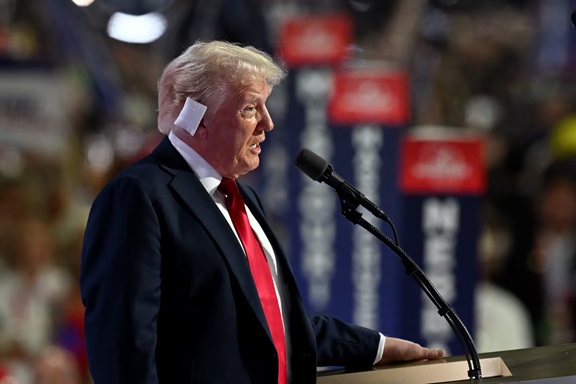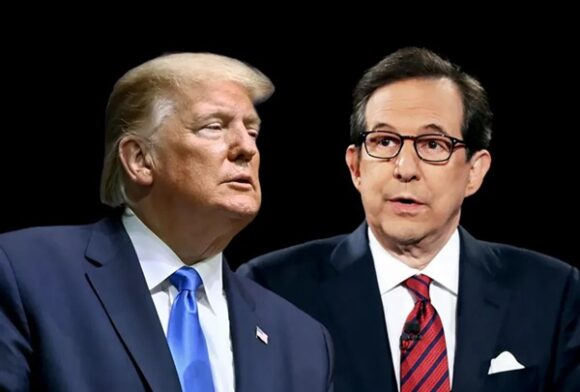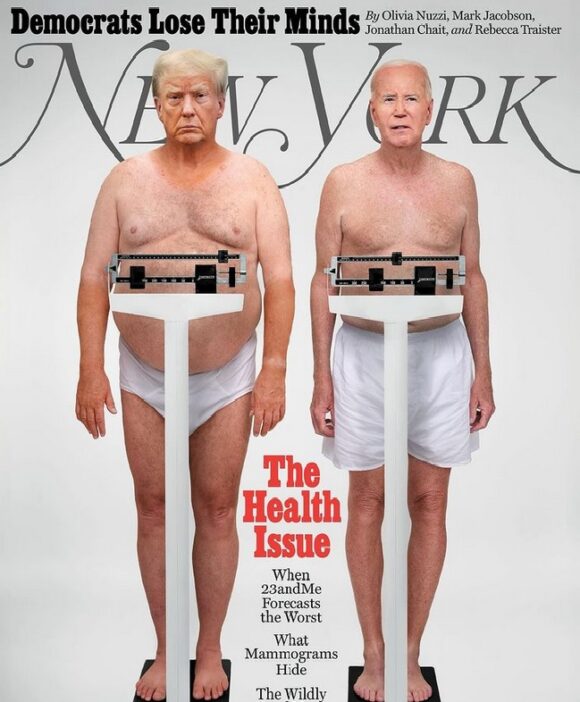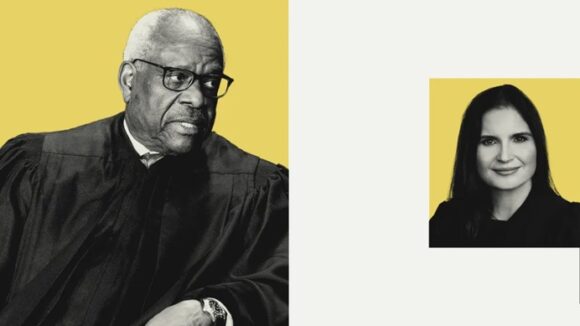 Courtesy of the Boston Globe. Leon Neal/Getty
Courtesy of the Boston Globe. Leon Neal/Getty
Dear Commons Community,
I watched Donald Trump’s acceptance speech of the Republican nomination for president last night and I found it long (about ninety minutes), repetitive, and rambling. For the first few minutes, he focused on last Saturday’s assassination attempt. He appeared humbler and vowed to unify the divisions in our country. He promised during his next term, everyone (Republicans and Democrats, Whites and Blacks, Asians and Hispanics) would be welcome. His portrayals of unity sought to erase the image of a man whose presidency often swirled in chaos and infighting and ended with a violent insurrection at the U.S. Capitol.
His new tone lasted about fifteen minutes.
Then, he called on state and federal prosecutors to drop all four criminal cases against him, including the one in which he was convicted of 34 felony counts in May.
“The Democrat party should immediately stop weaponizing the justice system and labeling their political opponent as an enemy of democracy,” he said.
He called former Democratic House Speaker Nancy Pelosi “crazy.” A few minutes later, he accused Democrats of cheating in elections. Four minutes later, he insulted the news media, referring to the CBS News program “Face the Nation” as “Deface the Nation.”
He repeated the lie that he used to incite the Jan. 6, 2021, assault on the Capitol — that the 2020 election had been stolen from him through cheating. Immediately after that, he made liars out of staffers who had told reporters that he would never mention the name of the man who had defeated him, claiming Biden, by name, was worse than the previous 10 worst presidents combined.
The speech devolved from there into Trump’s standard, oft-used lies from his rally speeches — that the economy on his watch was the best ever; that his trade agreements were marked improvements over the previous ones; that crime is currently out of control; and so on.
He also repeated promises and warnings with no basis in fact: that he would be able to balance the budget merely by increasing oil and gas production, or that an ongoing influx of illegal migrants would bankrupt Social Security and Medicare.
Below is a New York Times recap of the best and worst moments of Trump’s speech representing a variety of political views.
Tony
——————————————————————————————-
New York Times
July 19, 2024
Welcome to Opinion’s commentary for Night 4 of the Republican National Convention. Here’s what our columnists and contributors thought of the event, which culminated in Trump’s acceptance speech.
Best Moment
Kristen Soltis Anderson, contributing Opinion writer Donald Trump gave a compelling and moving description of what it was like to be under fire and pledged to represent all of America, not just half of America. That may be easier said than done.
David Brooks, Times columnist The first 20 minutes of the Trump speech. If he’d done the story about the assassination attempt and then added 15 minutes of policy, he would be cruising toward victory. He could have plausibly argued that he is a changed man.
Jane Coaston, contributing Opinion writer Hulk Hogan’s speech was his best performance since he beat Macho Man Randy Savage at WrestleMania V.
Matthew Continetti, fellow at the American Enterprise Institute Trump’s account of the attempt on his life was gripping. He displayed a vulnerability and humility that most people had never seen before. And when he kissed the fireman’s helmet of Corey Comperatore, the husband and father who was killed during last weekend’s shooting, Trump created yet another indelible image. It won’t be soon forgotten.
David French, Times columnist Trump’s tribute to Comperatore was touching and appropriate. Placing his uniform on the stage was a powerful visual reminder of the loss.
Matt Labash, author of the newsletter Slack Tide Trump was somewhat muted, nice and gracious. At least while on script. Very un-Trumpy. He almost seemed humbled by being shot. Can it endure? This is Trump. Of course it can’t. It didn’t even last one-fifth of his speech. Humility is for losers in the Trumpverse. So enjoy it while it lasts. Or lasted, since it’s already over.
Katherine Mangu-Ward, editor of Reason Trump’s decision to tear up his first speech and instead open on a note of unity was the right one: “It would be very bad if I got up and started going wild about how horrible everybody is and how corrupt and crooked, even if it’s true,” he said the day after the shooting. As the speech dragged on, he drifted from that resolution.
Dan McCarthy, editor of the periodical Modern Age Eric Trump stepped into the role normally played by his father and delivered galvanizing remarks, hitting all the campaign’s key themes. With the former president resolved to show his comparatively genial and gentler side, his son had the opportunity to lead the rhetorical charge, and he excelled.
Pamela Paul, Times columnist Trump defended the Secret Service men and women who protected him after the assassination attempt, refusing to give fodder to those far-right extremists who have attacked the people risking their lives in service of public figures. This was a rare moment when Trump did the right thing.
Zeynep Tufekci, Times columnist Great evening for golf and professional wrestling! Speakers included John Nieporte, a golf professional who caddied for Trump; Carrie Ruiz, the general manager of a Trump-owned golf course; Hogan (who ripped his shirt off); and Dana White, president of the U.F.C., a mixed martial arts promotion company.
Peter Wehner, contributing Opinion writer The beginning of Trump’s speech, when he recounted the assassination attempt. Parts of it were compelling. There seemed to be genuine gratitude in him, which heretofore had been an alien emotion to Trump.
Worst Moment
Anderson Not long into Trump’s speech, the momentum slowed, and he started playing the hits, only it was the acoustic version. His whole performance felt unusually low energy and unfocused.
Charles M. Blow, Times columnist I was nearly suffocated under all the lies and gaslighting during this convention, culminating Thursday in Trump’s attempt at a tear-jerker. They all tried to convince us he was a teddy bear and not a grizzly. They tried to make us empathize with a person who lacks that impulse, who trades in deceit, cruelty and vengeance. But Trump couldn’t resist returning to his familiar darkness, thus wiping out the entire effort to rehabilitate — and hide — the real him.
Brooks The rest of the Trump speech. There is no cure for narcissism. The part after the assassination-attempt story was one of the truly awful and self-indulgent political performances of our time. My brain has been bludgeoned into soporific exhaustion.
Coaston Every political convention feels uncannily like a sporting event for people who tell others how much they hate sports. This one was no different.
Continetti Trump’s acceptance speech was incredibly compelling — for the first 30 minutes or so. Then he began to ramble. The address lost much of its focus and power, but the audience didn’t seem to mind.
French After the first few minutes, the rest of the speech was just as long, rambling and disjointed as a typical Trump rally. It was a greatest-hits collection of Trump talking points, but the delivery was subdued. At times, the speech was actually boring. Trump has many flaws, but he’s rarely boring. On the last night of the convention, he was.
Labash Too many to choose from. All political conventions are cringe-worthy idolatry fests. But even by those low standards, there was so much abject Trump flattery going on among his cultish speakers that if this had been Kim Jong-un’s convention, he’d have told his propagandists, “Hey, fellas, dial it back a little.”
Mangu-Ward Trump made many false claims about immigration throughout his remarks, but the most absurd was: “You know who’s taking the jobs, the jobs that are created? One hundred and seven percent of those jobs are taken by illegal aliens.”
McCarthy Mike Pompeo was not a rousing speaker. And while he faithfully recited Trump’s foreign policy accomplishments, his presence was a reminder that the last administration included many hawkish old-guard Republicans who would have been equally comfortable serving under a president named Bush.
Paul Trump’s effort to convey vulnerability rang entirely opportunist and wholly insincere. It’s hard to imagine a near-death experience could be told in a way that evoked so little emotion. Something tells me this will not, in fact, be the last time he tells the story.
Tufekci Tucker Carlson, who abruptly left Fox News amid its lawsuit with Dominion Voting Systems for airing false claims about election stealing, showed up with a joke about stolen elections.
Wehner Once Trump really got going, his speech was rambling and narcissistic, filled with lies and nearly endless. It was a fusion of his stump speech and a text speech, making it incoherent and exceedingly boring. I experienced a feeling I was previously unfamiliar with: the desire to bring back Hulk Hogan.
What Else Caught Your Eye?
Anderson Trump was subdued in demeanor in the V.I.P. box. Hogan’s time onstage elicited the biggest smile all week.
Brooks Both parties are clearly working hard to lose this election. Trump’s speech has got to increase the chances that President Biden stays in the race.
Coaston Carlson described Trump as the “funniest person I’ve ever met in my life,” after saying in a text message, in 2021, “I hate him passionately,” because comedy is tragedy plus time.
Continetti The double bill of Hogan and Kid Rock made this Xennial smile.
French The Trump campaign is going hard for the male vote. After hearing from Hogan, Kid Rock and White, I half expected a Call of Duty streamer to come out and bring down the house.
Labash The fall-down funniest line of the night belonged to the Trump lawyer Alina Habba — resplendent in a white pantsuit — who said, “The only crime President Trump has committed is loving America.” She apparently hadn’t seen the Trump Village People “Y.M.C.A.” dance-video montage. Which made for at least two crimes.
Mangu-Ward Carlson’s dark vision of the political psyche. He riffed that Trump “turned down the most obvious opportunity in politics — to inflame the nation after being shot,” which he then called “an opportunity that almost every other politician I’ve ever met, and certainly his opponents, would have taken instantly.” Trying to keep the nation calm after an assassination attempt is the bare minimum.
McCarthy This was the convention that made pop culture great again. Hogan and Kid Rock, both in top form, brought back the cockiness that characterized the mass entertainment of a nation far less neurotic than America has lately become. Trump recognizes the power in that.
Paul The word “fight” was uttered frequently in the run-up to Trump’s speech, evoking his call to “Fight! Fight! Fight!” after a bullet grazed his ear and echoing a frequent theme in Trump’s rhetoric, as my colleague Carlos Lozada just noted. Trump rarely talks about working for America or serving it; he talks about fighting.
Tufekci The band had to play four songs to fill the dead time before Hogan’s appearance. Maybe Trump needed to invite more golf buddies. There were almost no Republican Party heavy hitters. If he wins again, few of the traditional Republicans who populated his first administration will be left to act as a brake.
Wehner Compared with Trump’s acceptance speeches in 2016 and 2020, which were unusual enough, this one was unrestrained, self-indulgent and undisciplined, radiating a sense of grievance. It was Trump untethered, which is the right way to understand what his second term would be. We can’t say we haven’t been warned.
Charles M. Blow, David Brooks, David French, Pamela Paul and Zeynep Tufekci are Times columnists.
Kristen Soltis Anderson is a contributing Opinion writer, a Republican pollster and the author of “The Selfie Vote.”
Jane Coaston is a contributing Opinion writer.
Matthew Continetti is a fellow at the American Enterprise Institute and the author of “The Right: The Hundred Year War for American Conservatism.”
Matt Labash, formerly a national correspondent at The Weekly Standard, is the author of “Fly Fishing With Darth Vader” and writes the newsletter Slack Tide.
Katherine Mangu-Ward (@kmanguward) is the editor in chief of Reason magazine.
Dan McCarthy is the editor of Modern Age: A Conservative Review.
Peter Wehner is a contributing Opinion writer and the author, most recently, of “The Death of Politics.”
 (Noam Galai/WireImage/Joe Raedle/Getty Images)
(Noam Galai/WireImage/Joe Raedle/Getty Images)










